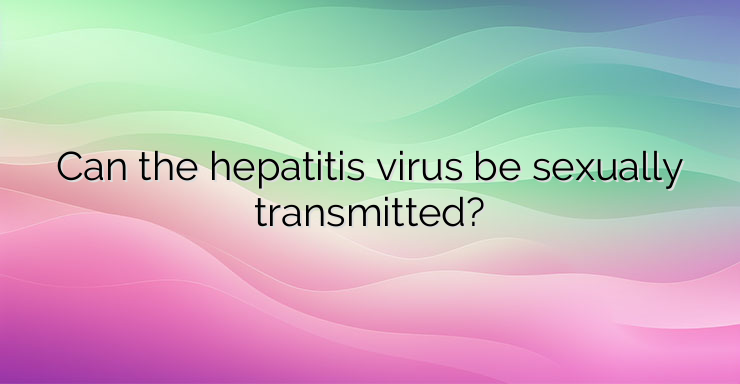What is the risk of transmitting the hepatitis virus through sexual contact? Some types of viral hepatitis can be transmitted through sexual contact, in addition to transmission in other ways. Each type of hepatitis virus has a different risk of sexual transmission. Hepatitis A Hepatitis A is easily spread through casual person-to-person contact and through food or water contaminated with the feces of infected people. This is called the faecal-oral or hand-to-mouth route. Hepatitis A can be transmitted in many ways that do not involve sharing medical needles or contact with body fluids. Intimate contact during sex can lead to the transmission of hepatitis A, especially anal/oral contact, but infection is certainly not limited to this mode of transmission. There is a vaccine to prevent hepatitis A infection. Hepatitis B Hepatitis B is the type of hepatitis most commonly associated with sexual transmission because the virus is present in semen, body fluids, and blood that can be transmitted in contact during unprotected sex. It is also transmitted by sharing needles or razors and other ways involving exposure to blood, such as mother-to-baby transmission during childbirth. The main route of transmission of the virus is through blood and body fluids and is not transmitted in other ways. Contagion cannot be effected from a toilet bowl or from accidental contact with an object that an infected person has touched. The good news is that hepatitis B can be prevented with a vaccine. Hepatitis C Sexual transmission of hepatitis C is generally considered very rare and is not thought to be the main mode of transmission of the virus. The hepatitis C virus is not easily transmitted through sexual contact. Hepatitis C is usually transmitted through exposure to blood from a shared needle during injection drug use and, to a much lesser extent, through exposure in health care settings. However, the Centers for Disease Control and Prevention (CDC) reports that studies have found that sexual transmission of the hepatitis C virus can occur. The risk is very low among heterosexual couples in regular relationships. There is an increased risk for people who have multiple sexual partners and for HIV-positive individuals. Unfortunately, there is no vaccine against hepatitis C. How can the risk of sexually transmitted hepatitis be reduced? To reduce the risk of sexually transmitted hepatitis, it is necessary to use a condom during any vaginal, oral or anal intercourse. It will also reduce the risk of other sexually transmitted diseases such as HIV, gonorrhea, syphilis, chlamydia and genital herpes. It is recommended to discuss with a doctor about vaccination against hepatitis A and hepatitis B. These immunizations have been standard for many years. It should be noted that while these vaccines may reduce the risk of hepatitis,they will not reduce the risk of contracting other STDs, and taking safer sex precautions is necessary as a line of defense against STDs. There is no sure symptom or sign that indicates that a person has hepatitis. Some infected people appear perfectly healthy even in advanced stages of the disease. Experts recommend talking openly with sexual partners about the risk of hepatitis and other sexually transmitted infections. However, if symptoms such as yellowing of the skin or eyes (a condition known as jaundice) are noticed, they may be due to hepatitis. Other symptoms of hepatitis include – fever, fatigue, loss of appetite, nausea, vomiting, joint or abdominal pain. Blood tests are available to determine the presence of sexually transmitted hepatitis. Any sexual activity that can cause scrapes, cuts or other trauma is particularly risky. Anal sex is considered more risky than vaginal sex for the transmission of hepatitis. Both forms of sex are riskier than oral sex. Transmission of hepatitis by kissing an infected person is unlikely, although deep kissing that involves the exchange of large amounts of saliva can lead to hepatitis B infection, especially if there are cuts or scrapes in the infected person’s mouth. References: 1. Centers for Disease Control and Prevention. Viral hepatitis 2. Tohme RA, Holmberg SD. Is sexual contact a major mode of hepatitis C virus transmission? 3. Verywell Health. Is Hepatitis a Sexually Transmitted Disease? 4. WebMD. Hepatitis and Sex: Frequently Asked Questionsespecially if there are cuts or scrapes in the infected person’s mouth. References: 1. Centers for Disease Control and Prevention. Viral hepatitis 2. Tohme RA, Holmberg SD. Is sexual contact a major mode of hepatitis C virus transmission? 3. Verywell Health. Is Hepatitis a Sexually Transmitted Disease? 4. WebMD. Hepatitis and Sex: Frequently Asked Questionsespecially if there are cuts or scrapes in the infected person’s mouth. References: 1. Centers for Disease Control and Prevention. Viral hepatitis 2. Tohme RA, Holmberg SD. Is sexual contact a major mode of hepatitis C virus transmission? 3. Verywell Health. Is Hepatitis a Sexually Transmitted Disease? 4. WebMD. Hepatitis and Sex: Frequently Asked Questions


Leave a Reply